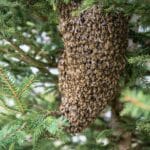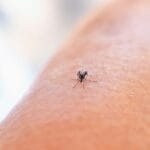If you see a trail of ants parading through your kitchen, it’s not just a slight nuisance—it’s an attack. But don’t panic, you can handle this. By implementing a few easy tactics, you can give those ants their marching orders and ensure they don’t return. Here’s how to react swiftly and take back your territory.
Key Points
- Find and block access points to stop ants from entering.
- Quickly clean up spills and remove food that ants are attracted to.
- Use natural deterrents like vinegar or essential oils as a short-term solution.
- Keep a regular cleaning schedule to prevent future invasions.
- Think about professional pest control if home remedies don’t work.
Stop Ants Before They Start: Fast Action Plans
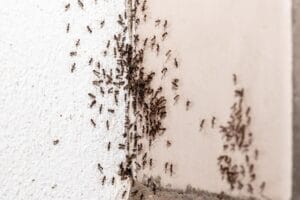
First off, let’s stop them from entering. Ants may be small, but they’re not supernatural—they can’t just materialize from nowhere. They’re entering from somewhere, and it’s your job to find out where. Look in the usual places: windows, doors, and any other small spaces. Once you find their route, it’s time to block it. Use caulk to fill any cracks or holes, and ensure your doors and windows are sealed correctly.
Then, you need to obliterate their footprints. Ants leave a hidden track of pheromones for their comrades to trace. Clean surfaces with a solution of equal parts vinegar and water to break their scent trails and tell them in no uncertain terms: ‘keep out’.
- Check around your home for ways ants can get in.
- Close up any cracks or holes with caulk or other materials.
- Wipe trails with a vinegar and water mix to break up scent trails.
Next, the kitchen—the main place for most ant invasions. Those crumbs from your breakfast? That’s a party for ants. Make sure you’re keeping things clean. Wipe down counters right after using them, vacuum often, and don’t leave dirty dishes in the sink. It’s easy: no food, no ants.
Finding Where Ants Get In
Put on your detective hat. Ants are able to squeeze through the smallest of cracks, so take a flashlight and inspect the outside of your house. Search for ant paths and take note of any small holes they could be coming in from. This could be as simple as a crack in the foundation or a space around a window frame. For more detailed guidance, check out these ant prevention tips to keep your home invasion-free.
After you’ve identified these entry points, it’s time to close them. For larger gaps, expanding foam can be a quick solution, while smaller cracks may just require a bit of silicone caulk. Keep in mind, it’s all about blocking access.
What to Do Right Away
So, you’ve found a line of ants in your house. Don’t just watch them—get your cleaning gear. You can wipe away their trail with soapy water, which will confuse the scout ants. Be sure to clean up any spills, especially if they’re sugary, and take the garbage out often. If you have pet food bowls, clean them often and try not to leave food in them.
Here’s a quick rundown on how to solve the problem:
- Don’t let spills and crumbs sit around—clean them up right away.
- Be sure to take out the trash frequently, especially when it’s full of food scraps.
- Keep food in sealed containers so ants aren’t tempted to come inside.
- Wash pet food dishes every day and store pet food in airtight containers.
Remember, the key is to be proactive and take action right away. When you follow these steps, you’re not just getting rid of the ants that have already made their way inside—you’re also preventing more from coming in.
Get Rid of Ants with Easy Home Remedies
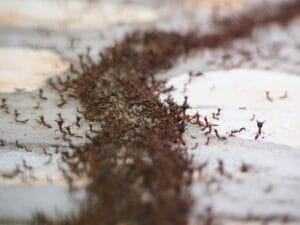
Ants may be tiny, but they come in large numbers. When they decide to invade, they do so en masse. But before you bring in the big guns (i.e., pest control), there are several proven strategies you can try using things you probably already have in your house.
Natural Repellents: A Safe and Effective Alternative
Ants are not fond of certain scents, and this can be used to your advantage. For example, citrus peels can act as a deterrent due to the limonene they contain. Simply scatter some lemon peel around points of entry. Alternatively, you can use essential oils like peppermint or tea tree oil. Soak a cotton ball and place it in areas you suspect. Not only will your home smell nice, but you’ll also create an invisible barrier against these tiny intruders.
Ant Deterrent Recipes to Try at Home
Store-bought solutions can be effective, but homemade ones can be just as good and are often safer for households with kids and pets. Here’s a quick recipe: mix equal parts of baking soda and powdered sugar and sprinkle it near the ants’ path. The sugar attracts the ants, and the baking soda eliminates them. Remember, the goal is to let the ants take the bait back to their nest, so resist the urge to clean it up too quickly.
For instance: A buddy saw ants entering through a window sill and put a combination of baking soda and powdered sugar along the path. Within several days, the quantity of ants decreased as they transported the combination back to their colony.
Fortress Security: Long-Term Prevention Strategies
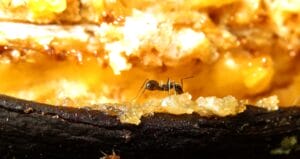
Keeping ants from coming in initially is the most successful long-term answer. This implies making your house as unappealing as possible to these tenacious pests.
Securing Entry Points: Windows, Doors, and More
Look around your house for any small openings that ants could use as entrances. Weather stripping and door sweeps are great for sealing spaces under doors. For windows, make sure the screens are not damaged and repair any holes. Check where utility pipes enter your house, as these are often forgotten entry points, and seal them with caulk or foam sealant.
Yard and Garden Changes to Deter Ants
Ants don’t just appear—they could be living in your yard. Keep your garden clean by removing debris and cutting back plants that touch your house, as these can act as bridges for ants. Mulch can be a hotspot for ant activity, so think about using less attractive alternatives like stone or rubber mulch.
Additionally, if you have trees with branches that hang over your roof, you should consider trimming them. Ants are great at climbing, and those branches provide them with a straight path into your attic or second floor.
Don’t ignore the importance of moisture. Ants require water, and things like leaky hoses, dripping taps, and bad drainage are essentially rolling out the red carpet for them. Be sure to fix any leaks as soon as possible and keep your gutters and downspouts clear so that water can flow away from your foundation.
Handling the Aftermath: Cleaning and Keeping Watch

After you’ve dealt with the immediate problem, it’s time to turn your attention to cleaning up and ensuring the ants don’t come back. This means a thorough cleaning, particularly in the kitchen, and setting up a system to keep an eye out for any future infestations.
Getting Things Back to Normal: Cleaning Up After an Ant Infestation
Once you’ve successfully gotten rid of the ants, you’ll need to do a thorough cleaning. Be sure to focus on kitchen counters, floors, and pantry shelves. Use a strong cleaner to get rid of any remaining pheromone trails and food residue. Don’t forget to clean under appliances and inside cabinets—anywhere crumbs might have fallen.
Set Up a Watchful Eye
Last but not least, always be on the lookout for new ant activity. Using sticky traps in key areas can help you keep an eye out for scouts. If you do see ants, don’t worry—just go back to the steps you’ve already learned. With a watchful eye and some elbow grease, you can keep your home free of ants.
Don’t forget, the secret to keeping ants away is being consistent. When you keep your home clean, seal up any places they could get in, and use things to keep them away, you’re not just dealing with a one-time invasion—you’re setting up a system that will protect your home all year long.
Commonly Asked Questions
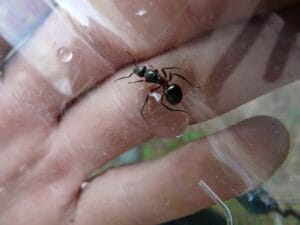
Do you have questions? You’re not the only one. These are some of the most frequently asked questions from homeowners dealing with ants and how to quickly get rid of them.
Is it possible to permanently get rid of ants?
- While it’s difficult to completely eradicate ants, you can greatly reduce their numbers.
- Regular upkeep and vigilance are essential for keeping your home free of ants.
- Professional pest control services can provide more lasting solutions.
To permanently rid your home of ants, you’ll need to combine good habits like keeping a clean house and sealing off entry points with professional treatments if necessary. However, because ants are a natural part of the environment, they may occasionally return, especially if they find a tempting food source or nesting area.
So, the best way to handle this is through constant prevention. If you’re proactive about cleanliness, home repairs, and monitoring, you can keep the ant population so low that you’ll hardly notice them.
Do natural ant repellents work as well as chemical ones?
Natural ant repellents can work, especially if you have a small infestation or if you’re using them as a preventative measure. They’re generally safer to use around children and pets and can be a good first step. However, if you have a larger or more stubborn infestation, you might need to use chemical repellents or hire a professional pest control service to really tackle the problem.
What is the frequency of cleaning required to avoid ant invasions?
For avoiding ant invasions, cleaning should ideally be done every day. Kitchen counters should be wiped down, floors should be swept to get rid of crumbs, and spills should be taken care of right away. A comprehensive cleaning at least once a week can aid in removing any possible food sources that may attract ants. For more detailed strategies on keeping your home pest-free, check out these pest-proofing secrets from the experts.
Is it okay to still see a couple of ants after the treatment?
Yes, it’s okay to still see a couple of ants after the treatment. Some ants may have been outside the nest during the treatment and are now disoriented without a trail to follow. Keep watching and continue preventive measures. If you continue to see a growing number of ants, you may need to reapply treatment or seek professional help.
Just because you spot a few ants after treatment doesn’t mean the treatment didn’t work. Ants are social bugs that live in groups, so it’s possible that not all the ants were impacted by the first treatment. It’s crucial to keep an eye on things and apply more treatments if needed.
What should I do if I discover a big ant colony close to my house?
If you discover a big ant colony close to your house, you should handle the situation with care:
- Don’t provoke the nest, as this can make the ants disperse and potentially lead to multiple satellite nests.
- Use a non-repellent insecticide designed for outdoor use, which allows ants to carry the poison back to the nest.
- Consider consulting a professional pest control service for safe and effective removal.
Large ant nests can be tough to eradicate, and sometimes the best course of action is to bring in professionals who have the experience and tools to handle the situation without causing further issues.
The content provided is an empty HTML structure. There is no content to rewrite.

